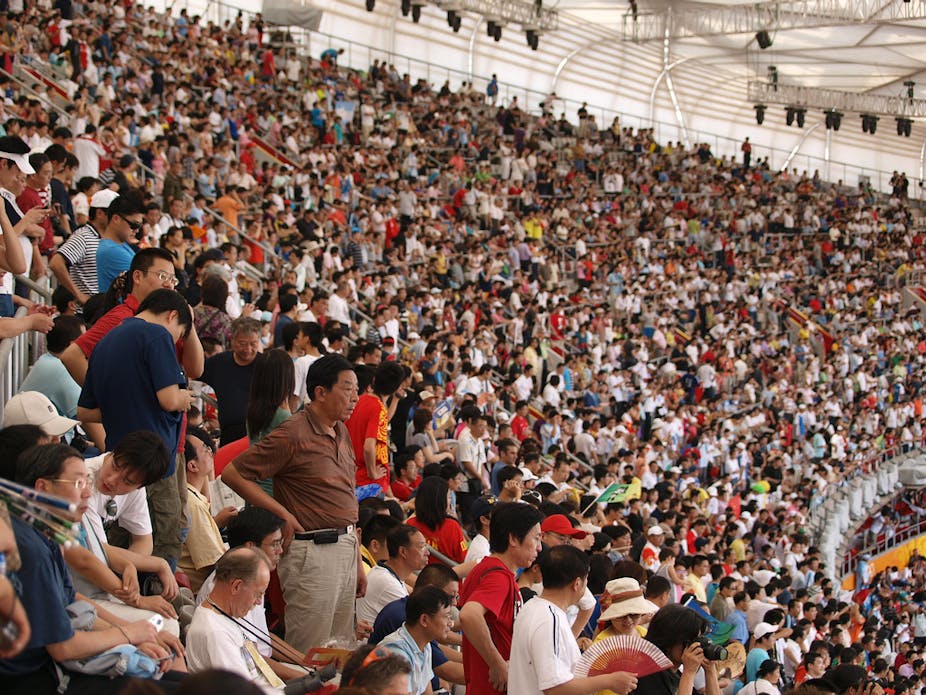After 35 years, the Chinese government announced the abolition of its controversial one child policy for one that will allow all citizens to have up to two children. It is not clear if the lifting of the ban will actually lead to a marked increase in China’s birth rate – while the birth rate has dramatically reduced since the policy was introduced, so too have those of neighbouring countries without such policies.
But whether or not Chinese parents decide to use their new-found rights to procreate, the move does raise questions. Would it be good or bad if more children were now born in China and the population grew? And what value might there be in any changes to China’s population size and structure?
There are several reasons to think that more Chinese children would be a good thing. These children, or at least the vast majority of them, can expect to live good lives. Chinese people born in 2015 have better expectations for health, education, and prosperity than at any other time in history. More children could also help to solve China’s two pressing demographic challenges: a rapidly ageing population and an over predominance of male children, caused by a sexist preference for boys under the one child policy.
But many people worry that the world in general, and China in particular, may be “overpopulated” and that more children will drain valuable resources, making things worse for everyone.

The “intuition of neutrality” would suggest that having a child is neither good nor bad because the welfare of currently-not-existing-but-merely-potential people does not make an outcome better or worse. This is almost certainly mistaken. Most of us would view it as terrible if human beings were to cease procreating. If we were offered a choice: exchange all our procreative functions for a lifetime of sheer bliss, or continue to live as we are and be guaranteed to thrive for generations to come, choosing the latter would suggest that the welfare of not-currently-existing-but-merely-potential people can make an outcome better.
Then there’s the idea that the welfare of potential people matters, but the number of them doesn’t. This view is not consistent with the intuition of neutrality. However, it does imply that the addition of more people in the future may only be a bad thing if it lowers everyone’s average welfare.
A hellish scenario
Consider two cases adapted from philosopher Derek Parfit’s puzzle. In Hell One, many people suffer and their lives are very bad for them, worse than if they never had existed. Hell Two has even more people with very bad lives, but also many people whose lives, while still bad and worse than nothing, are not quite as bad as those in Hell One. If the number of people in each case did not matter, then Hell Two must be better. But most of the people in Hell Two are better off than the people in Hell One, and only a minority have lives that are as bad. So if Hell Two is worse than Hell One, then the number of people in a population matters to us. We recognise that the minority of people in Hell Two represent a greater number of bad lives than the total population of Hell One.
However, if you don’t accept either of these views it’s hard to argue that the costs additional children bring with them will outweigh the benefits. One reason for this is what economists call “the diminishing marginal utility of consumption.”. This means that as you consume more, the utility or welfare you gain from this extra consumption will tend to diminish. One implication of this is that it is almost always better, in terms of producing more welfare, for a resource to be consumed by somebody who consumes less than by somebody who consumes more. This also implies that it is better for a fixed quantity of resources to be consumed by a larger number of people than by a smaller number. And it follows that, even if additional children do nothing to increase the stock of resources available to China’s population, they can still increase the welfare derived from them.
Existential risks
Even if an increasing population is in itself a good thing we might still view it as bad because of its wider effects. One effect of increasing China’s population might be to increase our existential risk, that is the likelihood of human extinction, or otherwise to reduce the human population in the long run.

Such arguments rely on the simulations of global population that suggest that the more people live at any one time the higher the risks. However, for many plausible causes of existential risk this is not so. For instance, man-made climate change does not result from the level of greenhouse gas emissions at any one time, but by the build-up of these gasses in the atmosphere over hundreds of years.
Similarly, the exhaustion of the Earth’s non-renewable resources is a long term process; it’s not simply the result of too many people consuming these resources at the same time. Such processes will continue whether global populations increase or decrease. Undoubtedly, the simultaneous global population can accelerate the processes that cause existential risk, but it will also affect the number of minds, and hands, that can be utilised to avoid or respond to these risks.
Another effect of an increasing population in China would more people living in poverty and inequality. People in China remain poorer, on average, than the rest of the world and 150m citizens live on the international poverty line of less than US$2 a day. An increase in the birth rate of these people is likely to increase global poverty and inequality, and there is evidence to suggest that rising populations in poorer countries have completely cancelled out the effect of all efforts to eradicate global poverty. So does this make this kind of population growth bad?
Philosophers often differentiate between inequality that results from the “mere-addition” of people who are less well off from inequality that results from making people worse off. While the morality of the latter kind of inequality is hotly debated, the philosophical consensus is that inequality that results from mere addition is not bad. As Larry Temkin puts it: “Typically, when we say one outcome’s inequality is worse than another’s, the same people exist in both outcomes and the worse-off fare worse in the one outcome than the other.” However, when the choice is between where the worse off exist and where they do not, “the inequality is not morally regrettable”.
The only reason that such inequality might be bad would be if some or all of the worse off lives created by population growth were not “worth living” and were even “worse than nothing”, for instance lives of constant and unbearable suffering. However, politicians and policy makers are seldom willing to contemplate that many lives could fall into this category.
Unless we take the controversial stance that many lives are not worth living, then we should conclude that a growing population in China is not only good in itself but its effects are far less negative than we might think. It follows that it is not only a good thing that the people of China have a choice to have more children but it would be a good thing if they chose to have them too.
In conjunction with Oxford University’s Practical Ethics blog

